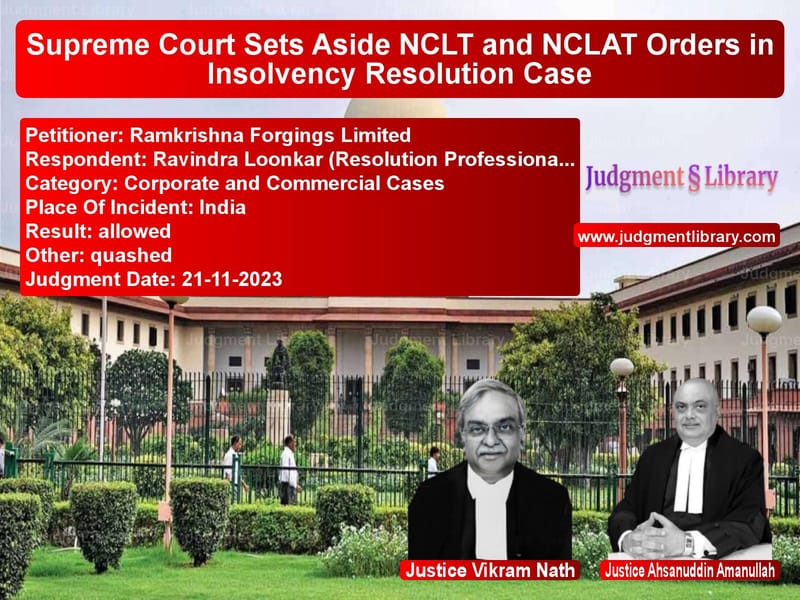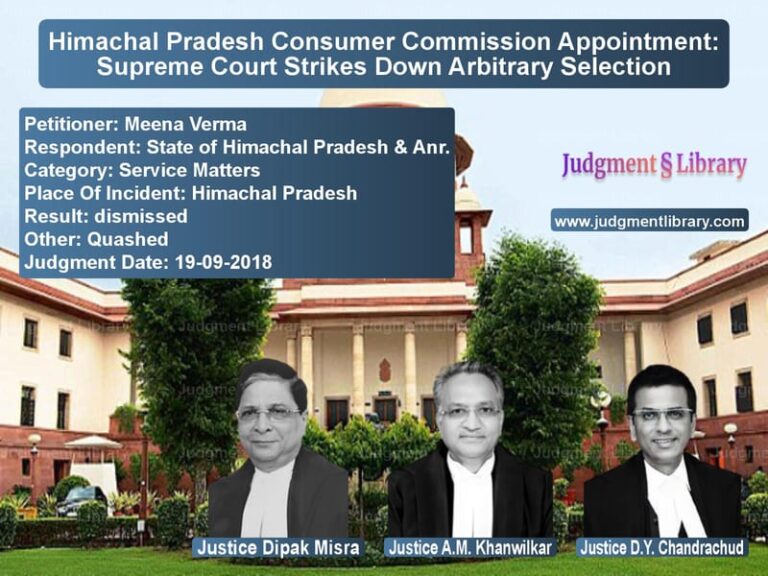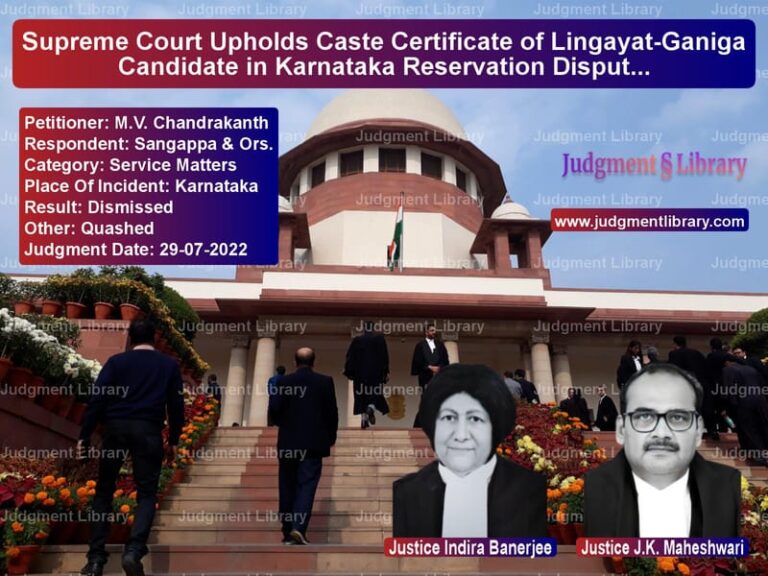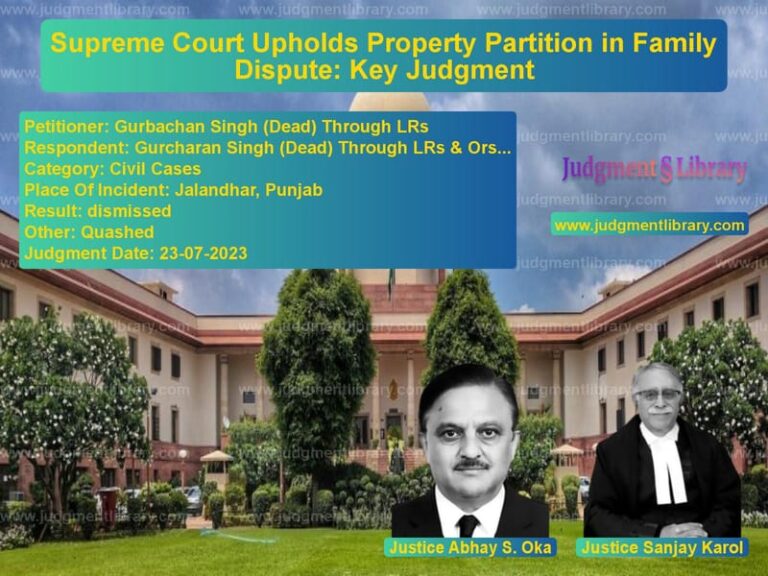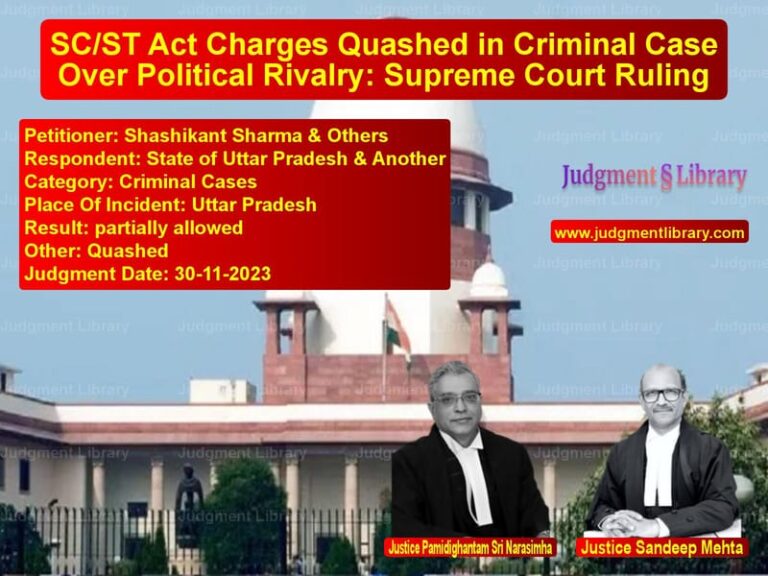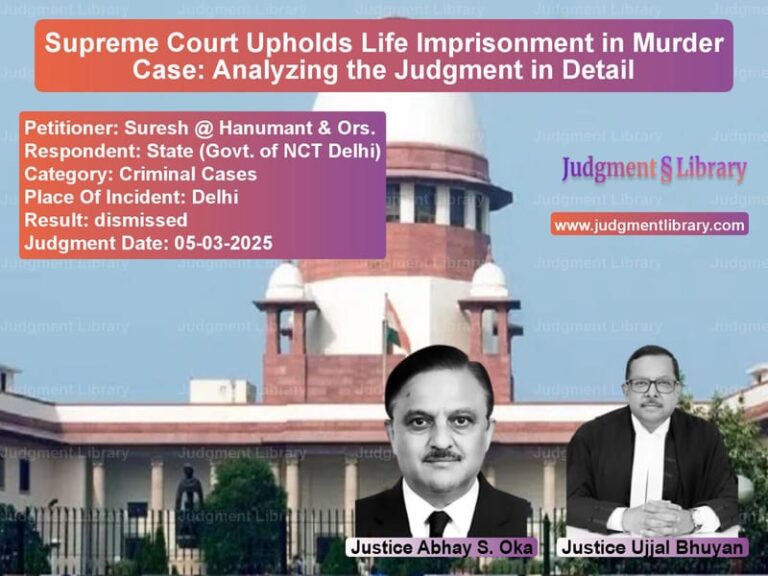Supreme Court Sets Aside NCLT and NCLAT Orders in Insolvency Resolution Case
The Supreme Court of India recently ruled in the case of Ramkrishna Forgings Limited vs. Ravindra Loonkar & Anr., addressing significant questions regarding the scope of judicial interference in insolvency resolution proceedings. The judgment overturned the National Company Law Tribunal (NCLT) and National Company Law Appellate Tribunal (NCLAT) decisions, reaffirming the principle that the commercial wisdom of the Committee of Creditors (CoC) must not be unduly interfered with by adjudicating authorities.
Background of the Case
The case arose out of the Corporate Insolvency Resolution Process (CIRP) initiated against ACIL Limited, a manufacturer of automotive components. The resolution professional (RP) invited expressions of interest for acquiring ACIL, and multiple resolution plans were considered. Ramkrishna Forgings Limited submitted its final resolution plan on August 5, 2019, offering to pay ₹129.5 crores, with ₹80.44 crores earmarked for financial creditors. The resolution plan was approved by the CoC with an overwhelming majority of 88.56% votes.
Despite this approval, the NCLT declined to approve the resolution plan, instead directing a fresh valuation of ACIL’s assets. This decision was upheld by the NCLAT on January 19, 2022, prompting an appeal to the Supreme Court.
Arguments by the Petitioner (Ramkrishna Forgings Limited)
The appellant contended:
- The CoC, after extensive negotiations, approved the resolution plan, and its decision should not be second-guessed by the NCLT or NCLAT.
- The NCLT exceeded its jurisdiction by ordering a fresh valuation, which was unnecessary and arbitrary.
- The valuation reports from two independent valuers had already been considered, and the CoC exercised its commercial wisdom in approving the resolution plan.
- The resolution plan was compliant with Sections 30 and 31 of the Insolvency and Bankruptcy Code (IBC), and there was no justification for judicial interference.
Arguments by the Respondents
The respondents, including the Resolution Professional (RP) and Committee of Creditors (CoC), supported the appellant’s stand, arguing that:
- The valuation exercise had already been conducted as per IBC regulations.
- The NCLT and NCLAT’s insistence on a fresh valuation was without legal basis and outside their jurisdiction.
- The resolution plan ensured the revival of ACIL, preventing its liquidation and protecting the interests of all stakeholders.
Supreme Court’s Observations
The Supreme Court examined the NCLT and NCLAT orders and found them to be legally unsustainable. Key observations included:
- On Judicial Interference in CoC’s Commercial Wisdom:
- The Court reiterated that CoC’s decision-making must be respected, as held in Committee of Creditors of Essar Steel India Ltd. vs. Satish Kumar Gupta and K. Sashidhar vs. Indian Overseas Bank.
- Judicial review in insolvency matters is limited to verifying compliance with statutory requirements, not reassessing financial viability.
- On Valuation of Corporate Debtor’s Assets:
- The NCLT erred in ordering a fresh valuation when two independent valuers had already submitted reports.
- Under IBC, the valuation process is conducted to aid CoC’s decision-making, and courts should not interfere without substantive reasons.
- On the Role of the Adjudicating Authority:
- The Supreme Court emphasized that NCLT’s role is confined to ensuring that a resolution plan meets the criteria under Section 30(2) of the IBC.
- The NCLT and NCLAT wrongly assumed an equity jurisdiction beyond their statutory mandate.
Key Excerpt from the Judgment
“The commercial wisdom of the CoC is paramount in the insolvency resolution process. The adjudicating authority cannot sit in appeal over the financial decisions of the CoC, nor can it introduce extraneous requirements such as fresh valuation unless a material irregularity is demonstrated.”
The Court also cited Pratap Technocrats Private Limited vs. Monitoring Committee of Reliance Infratel Limited, reaffirming that IBC does not confer residual equity jurisdiction on adjudicating authorities.
Read also: https://judgmentlibrary.com/supreme-court-holds-nclat-members-in-contempt-for-ignoring-its-order/
Final Judgment and Directions
The Supreme Court ruled:
- The appeal was allowed, and the NCLT and NCLAT orders were set aside.
- The resolution plan approved by the CoC was restored.
- The NCLT was directed to issue necessary orders for implementation of the resolution plan within three weeks.
This judgment reinforces the principle that insolvency resolution must proceed efficiently, without unnecessary judicial intervention, ensuring the timely resolution of distressed assets.
Petitioner Name: Ramkrishna Forgings Limited.Respondent Name: Ravindra Loonkar (Resolution Professional of ACIL Limited) & Committee of Creditors of ACIL Ltd..Judgment By: Justice Vikram Nath, Justice Ahsanuddin Amanullah.Place Of Incident: India.Judgment Date: 21-11-2023.
Don’t miss out on the full details! Download the complete judgment in PDF format below and gain valuable insights instantly!
Download Judgment: ramkrishna-forgings-vs-ravindra-loonkar-(re-supreme-court-of-india-judgment-dated-21-11-2023.pdf
Directly Download Judgment: Directly download this Judgment
See all petitions in Bankruptcy and Insolvency
See all petitions in Corporate Governance
See all petitions in unfair trade practices
See all petitions in Company Law
See all petitions in Judgment by Vikram Nath
See all petitions in Judgment by Ahsanuddin Amanullah
See all petitions in allowed
See all petitions in Quashed
See all petitions in supreme court of India judgments November 2023
See all petitions in 2023 judgments
See all posts in Corporate and Commercial Cases Category
See all allowed petitions in Corporate and Commercial Cases Category
See all Dismissed petitions in Corporate and Commercial Cases Category
See all partially allowed petitions in Corporate and Commercial Cases Category

